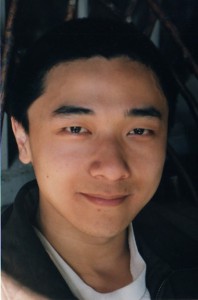written by Frank Dutkiewicz
Did you contribute to Daily Science Fiction‘s Kickstarter campaign? If so, thank you very much. They made their goal with room to spare. That means the daily emails with delightful and never-read-before work of science fiction and fantasy will continue. Did you catch all that June had to offer? If not, this is what you missed†�
“Pictures in Crayon” by Elizabeth Shack (debut 6/3 and reviewed by Dustin Adams) takes place in a far-future, dystopian world where the earth is dying, and children are taken off-world via a lottery drawing. The narrator wants to see other stars, wants to get off earth, wants to live, but she’s not the only child in her family.
I thought the ending was somewhat predictable, however, it was no less enjoyable, and melancholy.
“Note to Self” by Hans Hergot (debut 6/4 and reviewed by Dustin Adams) starts in such a humorous way that I was expecting a continuous laugh riot. However, the story turned sentimental and became the best of both worlds.
Thomas’s future self has won a time-travel contest in which he’s allowed to write six words to his past self to be delivered at a particular time. (Which isn’t fully explained, but doesn’t really matter.) I won’t spoil what the six words are, because what they mean is greater than what they say, which is what makes this story so great.
“Three Wishes” by Melissa Mead (debut 6/5 and reviewed by Dustin Adams)
In another delightful, twisted fairy tale from Melissa Mead, a golden coyote is stuck in a trap and thus rescued by a simple woodcutter. The woodcutter is given three wishes and mistakenly, and humorously, wastes the first two. His wife lets him have it for his foolishness, but demands the third wish be saved for something wholly selfish. She is a good wife. However, (spoiler) the woodcutter’s second wish absolutely needs to be undone.
This story, aptly, comes with a twist you might expect from a three-wish story. The twist, however, has a lot of heart.
“True Love” by Alex Shvartsman (debut 6/6 and reviewed by Dustin Adams)
At Temporal Excursions, Inc., you can step inside the mind of a past figure and experience their lives precisely as they did, minute by minute, in only an hour.
Molly seeks the experience of pure love. The kind, she says, that just isn’t seen around. However, she is repeatedly discouraged by the real lives of Helen of Troy and Cleopatra. Apparently our history books aren’t as accurate as the true day to day lives of these historic women.
But after each disappointment Travis, an employee of Temporal Excursions, is there to listen just as he is there to plug Molly back in during each subsequent visit until. Through with the past, Molly just might have discovered something of interest in her present.
“The Ships That Stir Upon The Shore” by Rahul Kanakia (debut 6/6 and reviewed by Dustin Adams).
In a future where the earth’s temperature is a deadly problem, people have been relegated into domes to survive. (However, this is not the focus of the story.) A broker of homes’ possessions sets his sights on a wealthy home whose owner is still alive. In the hopes that everything goes according to plan, based on past performance, he brings his family along to assist in the transition between the previous owner and them.
At first I was confused. The world made a lot of assumptions that I knew what the heck it was talking about. Then it settled into its story and I was sucked in – completely. What unfolds is as heartwarming as it can be in this quite dystopian future. I wished for a little more set-up regarding the change of heart. However, I still feel this is a top-notch story.
Simon gets an awesome gift that will spare him from pain in “Jumping Into The Sky” by Samantha Murray (debut 6/10 and reviewed by Frank D). Grandma had finally sent Simon a birthday gift worth using: invulnerability cream, good for one day. He always wanted to jump off a cliff, remembering the look on Laura’s face when he backed out on a dare from before. The cream grants him the courage to dive ahead; an easy thing to do when the consequences are eliminated.
“Jumping” is a tale for those who wished they could summon courage from a jar. This predictable storyline has an unpredictable finale. The side effect was logical, but unforeseen. Well done.
A miracle drug promises to cure everything in “Curing Day” by Dustin Adams (debut 6/11 and reviewed by Frank D). The protagonist is a nine year old boy centuries old. Pathway is a miracle inoculation that fixes all but erases memory. Shamus is one of the few who retains his memory. He alone sees the decay and remembers the ones who have died from accidents. The world is slowly falling apart and he alone can remember the slight changes of the effects disrepair.
“Curing Day” is a story I read in an infant draft. This final draft is a testament on how much work it takes to turn a good idea into a marketable story. Loved the concept of this piece , a world that decays while a society is locked in a pharmaceutical induced amnesia. Well done, my friend.
A bullied boy seeks sanctuary in his “City of Chrysantemum” by Ken Liu (debut 6/12 and reviewed by Frank D). Bobby is a target of bullies. The small boy is tormented and beaten daily. On the pages of his art and in the corner of his mind he imagines a prince like himself in a city where boys aren’t forced to fight and are free to live in peace.
“Chrysantemum” is a fantasy only in the mind of the author’s protagonist. Bobby has a tale so many can identify with. His school is his dungeon. His two classmates are his predators, seeking him out so they can dish out their sadistic punishment for their own pleasure.
“Chrysantemum” is likely the least speculative story DSF has ever published. The tale is sad because there is too much realism in it. Bobby is not just a victim of cruel kids who say hurtful words that will inflict harm on his confidence. He is practice for future felons earning their own education in what should be the safe confines of a public institution. Bobby’s make believe kingdom serves as is his sanity’s refuge, his way of coping in his adolescent hell.
If you are sensitive to children being abused, avoid this tale. But in my opinion it is a story we should all read.
A superhero finds her rival, friend, and lover in “Dark, Beautiful Force” by Jessica May Lin (debut 6/13 and reviewed by Frank D). The protagonist is a defender of justice who competes with another hero. The two develop a relationship as they battle the forces of evil and become intimate. The battle between good and evil will always carry on, regardless of the obstacles in life.
“Dark, Beautiful Force” is a tale of an extra special woman and her soul mate. The powers of the characters are unknown and the villains they fight are faceless. The struggle in this tale is of the inner turmoil the protagonist battles as she first competes than falls in love with her rival. The protagonist loses her unborn child while battling a vague antagonist. The loss leaves her hollow inside, and her depression drives a wedge between the two heroes. Her soulmate hatches a plan to save her from herself.
The vagueness of this superhero tale robs the story of its superhero flavor. The story almost could have been told without superhuman powers. The only fight that matters , to the protagonist and the reader , is the battle our heroine had with herself from the start. The plan her lover hatches (I would imagine) would do the heroine more harm than it could possibly do good. For all its vagueness, I found this tale nevertheless enjoyable, despite its dark conclusion.
“I’ll Leave The Light On” by Patricia Russo (debut 6/14 and reviewed by James Hanzelka)
Dahyana found the boy throwing rocks at a stop sign. She recognized him immediately by the glow. Mrs. Miller told her she would recognize them, and she had because they were like her. She took her time slowly developing rapport, drawing in the angry young man. He would always be angry until she could bring him to others like her. Bring him in, train him, teach him; only then can he fulfill his purpose.
I found the writing in this one a little uneven in spots, particularly the opening paragraph. If you work your way past that particular sandbar, you will find an intriguing story about people that live among us, but have a very different reality. I would encourage you to put in some extra effort and give this story a try.
“The Silver Witch” by Tara Calaby (debut 6/17 and reviewed by James Hanzelka)
When Rosalind was discovered straddling Leda the townspeople knew she was a witch. When the miller (whom she had rejected), the priest, and Leda’s betrothed testified they were sure. The decision was made. Rosalind must die to cleanse Leda’s soul of her spell. But when they tried to carry out the sentence the townspeople discovered something about the power of love.
This story is well written and gives us something to consider about how and who we fear in the world. It does so with a twist that that shows us even more. It also says something about the power of love. Give it a try.
A priest is sent to hell to find a man among the damned in “Holy Diver” by Gra Linnaea (debut 6/18 and reviewed by Frank D). The protagonist is chosen by God to find a single soul in the fiery pits of hell. God had him sacrifice himself so he would gain entrance into the underworld. Hell is like a prison, priests are singled out , as if they are criminals who have committed a crime judged too heinous even for the fellow prisoners to accept. The protagonist learns to adapt in hell, as he searches for a man God so badly wants him to find.
“Holy Diver” is so much like a war story. The protagonist is on a mission in enemy territory. He knows nothing of the man he is searching for or the reasons why God wants him to find him. He is just a loyal soldier in God’s army and does not question his unknown orders.
I found “Holy Diver” to be an extraordinary and risky tale. The mystery of what the damned priest could be looking for , and the landscape of hell he walked through – had me hooked from the start. The answer to this mystery was a stunner. A warning to the faithful: the twist to this story you may consider blasphemous, so you may want to avoid it. I, however, loved the direction and the implications of the finale.
Recommended.
The Big Bad Wolf plans a big meal in “Big Bad’s Hot Date” by Melissa Mead (debut 6/19 and reviewed by Frank D).The wolf of “three pigs” fame, plans a nice pork roast for his date. The trick is getting the slippery porkers to join in the meal. Thanks to his ingenuity, and the pigs’ predictable pattern, his date is destined to turn out just fine.
Inventive take on an old classic. I liked the way Ms Mead’s devious mind thinks. Well done.
Part of an immortal conscience faces irreversible death in “Restorative” by Andy Dudak (debut 6/20 and reviewed by Frank D). The 3877th instance of Fingal Boyd is told he cannot rejoin the collective conscience because he has been inflicted with a virus. His shell, or ‘meat puppet’ , a man named Ciaran who has whored out his body, reflects with bitter irony that they will die together. Regret fills 3877 as death nears. He has never cared for his host body before, but weighing your actions of your life , and how they affected others , is a new experience for the greater being of Boyd.
“Restorative” is a tale set in a repressive society. Although the story is too short to fully explore the ramifications of a conscience impressing itself into one of the downtrodden, the plot to this piece centers on one part of a split being abandoned by its greater self. The vessel 3877 has occupied was once its own person. Ciaran had sold himself to be used, and abused. Now used up, 3877 feels the consequences of what he has done to Ciaran, and 3877 does not like it.
My main complaint to “Restorative” is it was far too short. A far larger , and better , story was left untouched. A thought provoking story with a satisfying ending.
A grieving actress is asked to reprise a memorable role in “While Memory Holds a Seat” by Nina Kiriki Hoffman (debut 6/21 and reviewed by Frank D). Rose is a member of a planet-hopping traveling theater troop. Dark and tragic events in her past transformed the once bubbly girl into a withdrawn and depressed woman. A decision of what to preform must be made for the troop’s next stop. Verna, her daughter, suggest they do ‘Beauty and the Beast’, and wants Rose to play Belle.
“While Memory” is a story about a woman who has condemned herself to her own hell. A tragic accident has left her hollow inside. The tale is mostly a mini-biography of Rose’s past. It is all a set up for climactic finale that was dulled by the lengthy and depressing backstory.
A couple attempts to rid their world of a pest in “All Kinds to Make a World” by Georgina Bruce (debut 6/24 and reviewed by Frank D). The protagonist and his wife find a creature outside their home and do their best to kill it, but try as they might the little bugger refuses to die. They don’t give up at first, but in a weird Stockholm syndrome twist they come to adore the monster.
“All Kinds” is a strange story (I mean that with modest sincerity). Like the creature in the tale, I became endeared with it by the end.
Two young students pine for each other in “Pinned and Wriggling on the Wall” by Usman T Malik (debut 6/25 and reviewed by Frank D). The protagonist is spending one last evening with his girl, Sara , a med student with a talented hand for sketches that come to life. They are in love but her father makes it impossible for them to be together.
The subplot to “Pinned” is the two-dimensional beings that Sara has drawn in her notebook. One drawing attempts to escape while the protagonist makes a play for Sara’s heart. I confess, I did not connect the relevance and/or metaphor the author was seeking for this tale. I am afraid the story’s point was lost on me.
The innocence of youth can be quite tragic in “Such Days Deserved” by Lee Hallison (debut 6/26 and reviewed by Frank D). Annie and her young friends have claimed the empty lot as their own. They have dug a hole and called it their fort. So when their fort is occupied by a strange – and scary looking – visitor from beyond, they react in a most human way.
“Such Days” is ET gone wrong. The opening paragraphs open with Annie and her innocent hopes as she stares up at the stars, which makes the gravity of what happens afterwards very shocking. I think the events of this tale would probably be the most likely outcome of a first contact scenario. I think the choice of using children made this worked best. Well done.
Recommended.
A soldier’s bid to fight repression crosses lines in “The Frenchman’s Jihad” by JT Howard (debut 6/27 and reviewed by Frank D). Jean is part of an elite fighting unit combating the spread of contraband seed in the farming community. The son of a farmer cut down by thugs, Jean is happy he no longer works in the fields. His unit is out to stop the illegal seed trade, no matter what.
“Frenchman” is a tale set in a world of tyranny. It is a story where a soldier suddenly realizes he is on the wrong side. The author is an experienced warrior, and the tone and details shows the depth of his knowledge. “Frenchman” is a sci-fi war story very much like the speculative fiction tales told in the height of the Cold War. I found it to be crisp and compelling.
A sick woman exhausts the memories she stored for her daughter in “Melancholia in Bloom” by Damien Walters Grintalis (debut 6/28 and reviewed by Frank D). Helen has a family heirloom for her daughter Rebecca: a magical box that stores memories. It is a treasure Helen found after her mother died, and in it, are the strips of cloth and the notebook her mother left for her explaining the magic of the box. For years, Helen has stocked the box with rose petals full of memories and a diary she has kept for Rebecca, but a debilitating disease has struck Helen and memories meant for Rebecca are the only things that keep her connected to this world.
“Melancholia” is a story told from two perspectives. From Rebecca’s point of view seeing her mother as a once lively woman now locked in a vacant shell, and from the words in Helen’s diary as she lives with the horror of losing her mind. Rebecca’s story is one that thousands of people could tell; the experiences of watching a loved one succumb to Alzheimer’s. Her mother is a woman who is lost to her; a walking catatonic, a parent who has left this Earth, yet still lives. The pain of viewing the vibrant woman she once knew now locked in a shell is too much for her to bear. Helen’s story adds an extra dimension to the tale. The magical box of memories is an heirloom passed down through untold generations. She found it after her mother passed away and discovered the gifts of memories inside. The rose petals she placed inside the box are memories she intended to leave her daughter, but the memory-fading disease that has her in its grip makes the temptation to re-experience what she lost to great for her to resist.
This story has a premise very much like Michael Haynes’s Scraps, but, where Mr Haynes’s piece was a tale of beautiful discovery, Ms Grintalis’s is a heart-wrenching tragedy. The two subplots of “Melancholia” complement each other. Helen is aware of the injustice she is doing to the boxes legacy and of the gift she is robing her own daughter, but the reader can’t blame her for it. Her written confession that choosing not to seeing a doctor when the first signs appear because it would ‘make it real’ is something we all can sympathize with. The recaptured memories allow Helen to be normal once again, even if it is for a brief moment. They keep the disease at bay, but the memories she has stored , and meant for Rebecca to experience , are finite in number and will be gone once spent.
I wondered when I finished this tale if Daily SF was Ms Grintalis’s first choice to publish her story. I’d imagine that a good many publications would have told her that it wasn’t right for them; a modern fantasy, short in length, a quick narrative and , most of all , an ending that was anything but happy. Not quite dark enough for a publisher of horror but the complete absence of cheer would have likely disqualified it for a bunch of publications and that is too bad. The early speculative fiction TV classic Twilight Zone proved that the very best tales don’t have to have a happy ending for them to be enjoyable. In fact, the bitterest endings in that show are where it achieved its greatest accolades, and like those memorable but bitter episodes this story deserves praise reserved for a true classic.
“Melancholia in Bloom” is a dynamite work of art. From its aptly named title to its somber finale this is a tale worthy of remembrance. Thank you Daily SF for delivering it to my email box.
Highly recommended.
And then there was one†�
On June 27th Dr. Steven Wittenberg Gordon announced on his writer’s blog , Songs of Eretz – that he would no longer be reviewing Daily SF on a regular basis. For an entire year, Dr. Gordon wrote a review of every DSF story the day it debuted , no small feat. His reviews were honest and thoughtful, and he didn’t miss one in all that time , including the ones that were written by the Diabolical Plots staff. And to prove we can take it, as well as dish it out, here is what he thought of our work.
“Coin Op” by David Steffen
The business-like, complete lack of emotional response from the android was amusing, as were its sexual extortion tactics. A snide comment at the end of story detracted a bit; there was a missed opportunity to make this a moral tale with a chilling (ahem) climax. 3 out of 7 rocket-dragons.
“This Is Your Problem, Right Here” by David Steffen
This story was revolting and hilarious at the same time. Original and memorable. 7 out of 7 rocket-dragons
“Curing Day” by Dustin Adams
There is certainly the grain of a great story here. I wish Mr. Adams would have provided some explanation for how the anti-aging drug works and why the side-effect occurs. The story is a little difficult to follow, but its original premise makes it worth reading. 4 out of 7 rocket-dragons.
“Fool’s Gold” by Frank Dutkiewicz
A good story, but the intellectual dialogue from the mouths of supposedly uneducated serfs was distracting. 5 rocket-dragons.
Dr. Gordon provided what I’ve been claiming Daily SF deserves from the leading reviewers of speculative fiction , insightful, thoughtful, and honest assessments of the works offered by one of the leading publishers of short, genre specific fiction in the industry. It is a disgrace that the recognized reviewers have been neglected by them and a shame Songs of Eretz will no longer picking up their slack. We will miss reading the doctor’s opinions.
But hey, if the good doc would like to keep a toe hold in DSF reviews, we would be happy to make room for him. I’ll keep your work load light, Steve.
 Why are these two people so happy? Because you came through for them. The editors asked for your help in funding Daily SF and you didn’t disappoint. They met their goals with room to spare. On behalf of Jon and Michele, thank you for your support.
Why are these two people so happy? Because you came through for them. The editors asked for your help in funding Daily SF and you didn’t disappoint. They met their goals with room to spare. On behalf of Jon and Michele, thank you for your support.

 Damien Angelica Walters’ work has appeared or is forthcoming in various magazines and anthologies, including
Damien Angelica Walters’ work has appeared or is forthcoming in various magazines and anthologies, including  Frank Dutkiewicz needs no introduction.
Frank Dutkiewicz needs no introduction.

